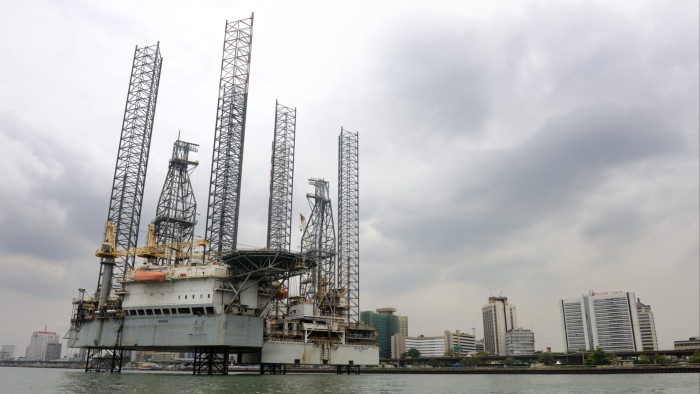Oil executive Osayande Igiehon grew up in an area of Nigeria intersected with pipelines — part of the extensive infrastructure established by foreign energy companies to tap his country’s rich reserves.
Igiehon believes this first-hand knowledge of the country gives Heirs Energies, the company he leads, a distinct advantage as it steps in to fill the gap left by the majors pulling back from Africa’s largest oil producer.
Heirs is among the domestic companies at the forefront of a historic shift in ownership of Nigeria’s oil wealth, as the international groups retreat and ambitious local companies step up to replace them.
“The previous operators lost their social licence to operate,” the Heirs chief executive said, referring to the strained relationship between large oil companies and the local populations where they operated.
“We’re able to move around unfettered because we have a robust relationship with the communities,” added Igiehon, who previously worked for Shell. “This is an indication of what indigenous companies are able to do.”

The withdrawal of the majors that once dominated Nigeria’s onshore oil industry is a result of dwindling returns, long-standing concerns about environmental damage and oil theft, as well as tensions with communities.
The emergence of a cohort of locally led companies that have invested large sums to buy up the same assets constitutes a pivotal moment for Nigeria and the domestic companies seeking to move up the value chain from providing ancillary services to operating their own oilfields.
“This is the most significant of the divestment cycles that has happened in Nigeria,” said Ufoma Immanuel, managing director of Chappal Energies, another domestic champion.
“The bulk of Nigeria’s production will sit with local players. Every other divestment cycle hasn’t moved the needle in that respect, but this one will in terms of scale, relevance and significance.”
In the past year, London and Lagos-listed Seplat acquired ExxonMobil’s assets in Nigeria, Chappal Energies bought the local operation of Norway’s state-owned Equinor for $1.2bn, including its share in one of Nigeria’s largest deep water fields, and Italy’s Eni sold its Nigerian arm to Oando, a company listed in Lagos and Johannesburg, in a deal worth $783mn.
Shell also sold its onshore business in a $1.3bn deal. The Anglo-Dutch company, which is synonymous with Nigeria’s oil industry and drilled the country’s first successful well in 1956, is not leaving entirely, but is switching focus to offshore fields in the Gulf of Guinea with the potential for greater returns and fewer security issues.
The Nigerian owners operate differently, eschewing the large corporate structures of their well-funded predecessors and developing assets that had often been neglected.
Wale Tinubu, chief executive of Oando, said his company has kept costs down by hiring local suppliers and staff, a process that also included letting go of 75 expatriate workers inherited from Eni.
“We have speed, agility and very good knowledge of our local environment,” said Tinubu, a nephew of President Bola Tinubu. “This will enable us to deliver projects at much cheaper costs.”
Another savings comes from the use of brownfield sites that do not always require the full exploration costs associated with new fields.
Igiehon said Heirs, which in 2021 paid $533mn for 45 per cent of an onshore oilfield jointly owned by Shell, Total and Eni, had doubled oil output to 55,000 barrels a day in the time since it took over the assets.
“We’ve not drilled any new wells to double production,” he explained, but had instead “reactivated existing wells and infrastructure [that had] been neglected for quite some time”.
The key advantage for locally led companies was in better managing the tensions that have plagued oil drilling in Nigeria for almost seven decades.
Host communities have often felt their concerns over environmental degradation were not taken seriously by foreign majors or the Nigerian government. Clean-up operations of decades-old oil spills have floundered.
“Indigenous companies are able to build a more respectful and more inclusive relationship and ecosystem in working with communities,” Igiehon said.
“This has a knock-on effect on security,” he added, “because if you have a strong alignment with the community, it increases the security of the operating environment. Those twin risks are tied together.”
Security remains a challenge, as pipeline theft continues to disrupt operations. International companies were frustrated by a lack of progress from national government in stemming the problem.
The current administration has sought to address the issue, including by renewing the contract of a former militant to protect installations in the oil-producing Niger Delta. Nigeria’s production has risen steadily over the past year, and was at 1.4mn b/d in March, according to Opec data.
“We see the prevention of oil theft as critical and see security as our main challenge,” said Oando’s Tinubu.
The new owners also need to raise capital to operate the assets. African energy groups have complained about their inability to secure investment for capital-intensive projects, with foreign financiers often wary of injecting finance into the continent. Renaissance Africa Energy faced questions from Nigeria’s industry regulator about whether it could fund the Shell deal before it was approved.
Critics have also questioned how much of Nigeria’s oil wealth is available to extract, given the majors exited after peak production. Oando’s Tinubu insisted there was “substantial life” in his company’s assets, with about 1bn barrels of oil yet to be tapped.
Igiehon of Heirs also thought US President Donald Trump’s love for fossil fuels provided scope for fresh investment in Nigeria’s oil industry.
“Companies that talked about making a significant shift [away] from hydrocarbons . . . are beating a retreat,” he said. “The position of the US administration is a marked change in posture towards hydrocarbons and that’s rippling through the whole ecosystem.”
https://www.ft.com/content/01fcfd0e-488d-4680-9e58-0c0a8f256bc2


